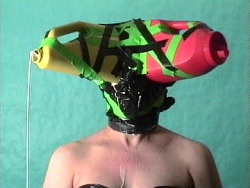In Lieder, Donegan sets up a series of charged relationships -- between artist and model, art object and artistic "gesture," performer and viewer. Donegan is rendered anonymous in an absurdist mask, her head wrapped in plastic bottles and duct-tape, her pregnant body swathed in a black garbage bag.
Whoa Whoa Studio refracts Donegan's earlier performance work through the lens of a studio art practice. The artist subverts the tradition of studio painting by using a computer to make simple line drawings; the computer is then transformed into a canvas through the act of directly marking the monitor.
In Cellardoor, Donegan makes a direct connection between her plastic bottle mask and a camera. She holds the bottle mask by its handle and pans the room as though she were operating a video camera. The perspective shifts between a static shot of the artist and the searching gaze from inside the plastic bottle.
Description
The artist writes: "These works form a capstone to concerns that have been in my work since I began to make video — the artist's studio as theatre, the self-conscious/self-reflexive gesture that unites performance and painting, creation unraveled. The space for painting/performance is very shallow — a makeshift set, the television screen, the frame of a painting. In this tautological space the performer, both object and subject, views herself from both sides of the mirror. The gestures performed are fleeting, interrupted, handicapped; the performer's back is against the wall. The imagery plays a game with elements that are part of the creative process — clean and dirty, sight and blindness, fullness and emptiness, chance and effort."



